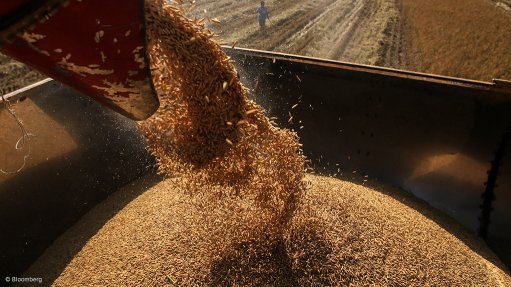
Photo by: Bloomberg
Industry body Grain South Africa (Grain SA) says grain production in South Africa went from experiencing extreme drought in recent years to excessive rainfall in certain areas of the country currently.
Although producers are always grateful for rain, the season so far has created many challenges, where producers could not access fields on time and where water damage has occurred.
In some cases, the excessive rains have affected producers’ total expected production.
Grain SA says several reports have confirmed that the rainfall figure for December was the highest in 100 years. This was accompanied by higher-than-average hail damage in certain areas of South Africa.
Although it is difficult to quantify the extent of the damage so early in the season, Grain SA, through a questionnaire, conducted a survey to determine the exposure of summer grain plantings to water damage. The questionnaire was completed by 434 producers.
It found that 20% of grain producers have had more than 60% of their white maize plantings exposed to water damage, and about 15% of their yellow maize, 13% of soybeans and 17% of their sunflowers exposed to water damage.
In the western area of the Free State, 39% of producers have reported water damage exposure to white maize. While the east of the country and parts of North West also experienced water damage, this has been less severe than in the Free State.
Grain SA points out that the actual impact on area planted may only become clear from January 27 when the National Crop Estimates Committee publishes the preliminary planting figures, while the impact of water damage on production will only really be determined with the first summer grain production estimate on February 27.
The organisation explains that the questionnaire serves to indicate the possible exposure to waterlogged conditions ahead of the published figures.
Further, Grain SA says the winter grain harvesting conditions were also by no means easier. In the Western Cape, rains during harvest time created difficult conditions and several producers suffered yield and grade losses.
Grain SA is concerned about the effects of extreme weather patterns, particularly at a time when some producers are still recovering financially from the droughts of recent years.
Fortunately, the international grain prices are at favourable levels, it points out.
The industry body has called on government to put in place an affordable crop insurance scheme so that producers can better manage their risks.
“South African producers have to compete with global producers who have access to these kinds of benefits and supportive mechanisms in difficult production conditions,” Grain SA states.
The organisation has advised producers to contact their financiers well in advance if large-scale damage to their crops is expected.